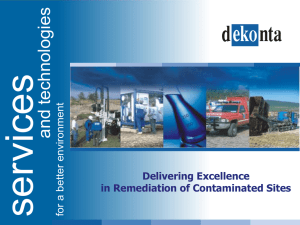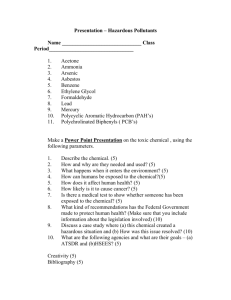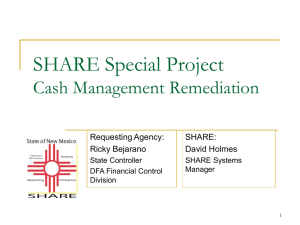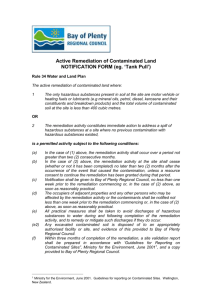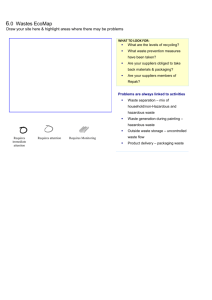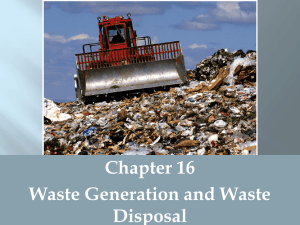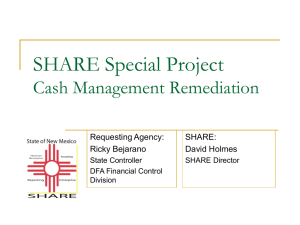Syllabus - Florida Atlantic University
advertisement
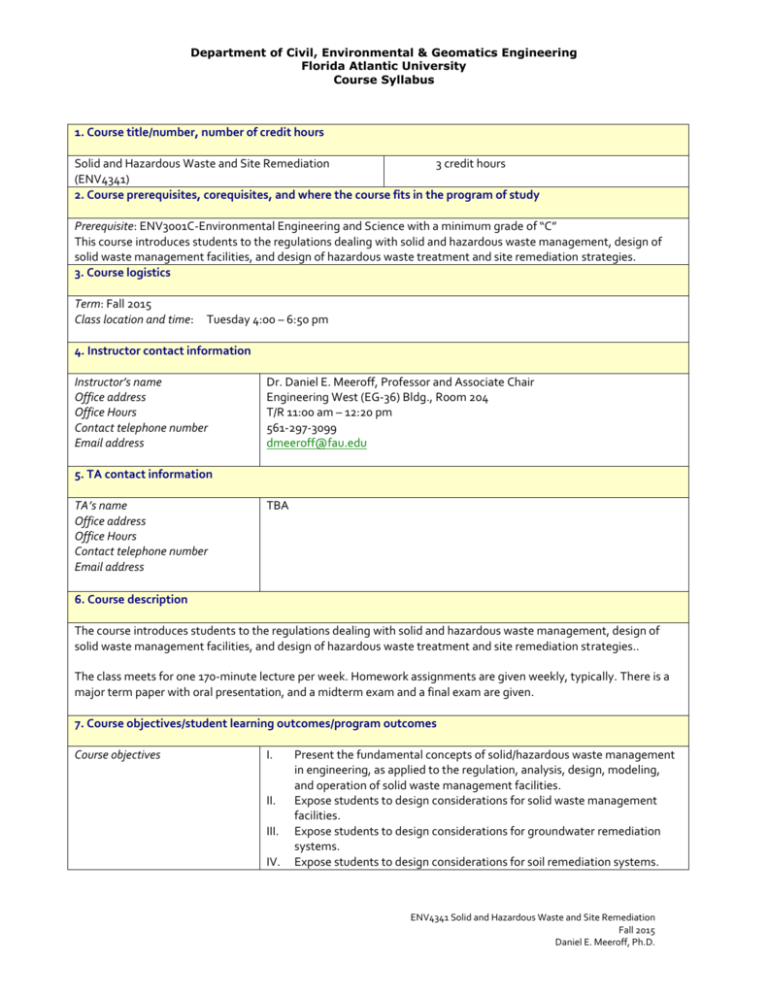
Department of Civil, Environmental & Geomatics Engineering Florida Atlantic University Course Syllabus 1. Course title/number, number of credit hours Solid and Hazardous Waste and Site Remediation 3 credit hours (ENV4341) 2. Course prerequisites, corequisites, and where the course fits in the program of study Prerequisite: ENV3001C-Environmental Engineering and Science with a minimum grade of “C” This course introduces students to the regulations dealing with solid and hazardous waste management, design of solid waste management facilities, and design of hazardous waste treatment and site remediation strategies. 3. Course logistics Term: Fall 2015 Class location and time: Tuesday 4:00 – 6:50 pm 4. Instructor contact information Instructor’s name Office address Office Hours Contact telephone number Email address Dr. Daniel E. Meeroff, Professor and Associate Chair Engineering West (EG-36) Bldg., Room 204 T/R 11:00 am – 12:20 pm 561-297-3099 dmeeroff@fau.edu 5. TA contact information TA’s name Office address Office Hours Contact telephone number Email address TBA 6. Course description The course introduces students to the regulations dealing with solid and hazardous waste management, design of solid waste management facilities, and design of hazardous waste treatment and site remediation strategies.. The class meets for one 170-minute lecture per week. Homework assignments are given weekly, typically. There is a major term paper with oral presentation, and a midterm exam and a final exam are given. 7. Course objectives/student learning outcomes/program outcomes Course objectives I. II. III. IV. Present the fundamental concepts of solid/hazardous waste management in engineering, as applied to the regulation, analysis, design, modeling, and operation of solid waste management facilities. Expose students to design considerations for solid waste management facilities. Expose students to design considerations for groundwater remediation systems. Expose students to design considerations for soil remediation systems. ENV4341 Solid and Hazardous Waste and Site Remediation Fall 2015 Daniel E. Meeroff, Ph.D. Department of Civil, Environmental & Geomatics Engineering Florida Atlantic University Course Syllabus Student learning outcomes & relationship to ABET a-k objectives A. Ability to understand the fundamental solid and hazardous waste management concepts and regulations necessary to analyze basic civil/environmental engineering problems. (a, b, c, e, f, h, k) B. Ability to apply design landfill facilities. (a, b, e, f, h, k) C. Ability to select and design an appropriate groundwater or soil remediation system for a given scenario (b, e, f, h, j) D. Ability to communicate effectively about solid/hazardous waste management and site remediation issues in environmental engineering (d, e, f, g, i) Relationship to program Objective A. Practice environmental engineering within the general H educational objectives areas of water and wastewater, air quality, solid and hazardous waste, groundwater and soil remediation, and sustainability and pollution prevention in the organizations that employ them. Objective B: Advance their knowledge of environmental engineering, H both formally and informally, by engaging in lifelong learning experiences including attainment of professional licensure, and/or graduate studies. Objective C: Serve as effective professionals, based on strong M interpersonal and teamwork skills, an understanding of professional and ethical responsibility, and a willingness to take the initiative and seek progressive responsibilities. Objective D: Participate as leaders in activities that support service to, H and/or economic development of, the region, the state and the nation 8. Course evaluation method (note percentages subject to change) Midterm Exam 27% Final Exam 33% Modeling and Case Study Reports/Presentations Class Assignments, Homework, Discussion Boards Class Participation 18% Note: The minimum grade required to pass the course is C. 17% 5% Attendance to class is required. You are expected to participate in all class sessions and keep up with the material. You are expected to participate in all class sessions. You are not expected to be a distraction in the class. Final grades will be reduced by one letter for class disruption of lack of participation (as determined by the instructor). Participation in University-approved activities or religious observances, with prior notice, will not be penalized. Keep copies of all quizzes and homework assignments for ABET purposes. Tests are open book, but NOT open notes or homework. 9. Course grading scale There are no fixed criteria for the grading scale. The overall performance as related to course objectives and outcomes is evaluated and considered during grading. See the supplementary Course Policies Document for the program guidelines on course grading. 10. Policy on makeup tests, late work, and incompletes ENV4341 Solid and Hazardous Waste and Site Remediation Fall 2015 Daniel E. Meeroff, Ph.D. Department of Civil, Environmental & Geomatics Engineering Florida Atlantic University Course Syllabus Exams will be given only at the scheduled times and places, unless previous arrangements have been made no less than one (1) full week in advance. No one is exempt from exams. Makeups are given only if there is solid evidence of a medical or otherwise serious emergency that prevented the student of participating in the exam. Makeup exams will be administered and proctored by department personnel unless there are other pre-approved arrangements. Late work is not acceptable. Incomplete grades are against the policy of the department. Unless there is solid evidence of medical or otherwise serious emergency situation, incomplete grades will not be given. Note: Incomplete grades are only reserved for those students who were passing but could not complete the required work due to exceptional circumstances. 11. Special course requirements The goal of integrating writing in this course is to improve students’ ability to produce professional quality engineering reports. Contact the University Center for Excellence in Writing at 561-297-3498 or www.fau.edu/UCEW for assistance. If you need help finding appropriate research or background information for reports, try the libguide: http://libguides.fau.edu/basic_engineering‐boca Report all technical problems in Blackboard to the IRM helpdesk (http://www.fau.edu/helpdesk) 12. Classroom etiquette policy University policy requires that in order to enhance and maintain a productive atmosphere for education, personal communication devices, such as cellular phones and laptops, are to be disabled in face‐to‐face class sessions. Please review the university Netiquette policy guidelines at http://www.fau.edu/irm/about/netiquette.php. Remember you are an adult—your communication with the professor and your classmates should be appropriate. You are responsible for reading all announcements posted by the instructor. Check the announcements each time you login to be sure you have read all of them since your last login session. To communicate within the course through Blackboard, the Ask the Professor discussion board link is the preferred method to contact your instructor. Except for Saturdays, Sundays, and holidays, I will respond to messages generally within 48 hours. Asking course related questions in this way allows other participants with the same question to benefit from the responses. Also, make sure you review this forum prior to posting a question; it may have already been asked and answered in previous posts. Such messages should be used to communicate public matters. Only personal or confidential matters should be sent via email to the professor, all others will be ignored. 13. Disability policy statement In compliance with the Americans with Disabilities Act (ADA), students who require special accommodations due to a disability to properly execute coursework must register with the Office for Students with Disabilities (OSD) located in Boca Raton campus, SU 133 (561) 297-3880 and follow all OSD procedures. 14. Honor code policy Students at Florida Atlantic University are expected to maintain the highest ethical standards. Academic dishonesty is considered a serious breach of these ethical standards, because it interferes with the university mission to provide a high quality education in which no student enjoys unfair advantage over any other. Academic dishonesty is also destructive of the university community, which is grounded in a system of mutual trust and place high value on personal integrity and individual responsibility. Harsh penalties are associated with academic dishonesty. See University Regulation 4.001 at www.fau.edu/regulations/chapter4/4.001_Code_of_Academic_Integrity.pdf 15. Required texts/reading ENV4341 Solid and Hazardous Waste and Site Remediation Fall 2015 Daniel E. Meeroff, Ph.D. Department of Civil, Environmental & Geomatics Engineering Florida Atlantic University Course Syllabus 1. Worrell, William, and P. Vesilind. Solid Waste Engineering, SI Version. Cengage Learning, 2011. ISBN 143906217X 2. Handouts provided by instructor 3. Blackboard registration 16. Supplementary/recommended readings 1. 2. 3. 4. 5. 6. 7. 8. 9. 10. 11. 12. 13. 14. 15. 16. Solid Waste Engineering, Vesilind, Worrell, Reinhart, 2001, RCRA Orientation Manual 2006, US EPA, http://www.epa.gov/epaoswer/general/orientat/ Tchobanoglous, G., Theisen, H., Vigil, S., Integrated Solid Waste Management: Engineering Principles and Management Issues, McGraw-Hill Inc., New York, 1993. LaGrega, Michael D., Phillip L. Buckingham, and Jeffrey C. Evans. Hazardous waste management. Waveland Press, 2010. McBean, Edward A., Frank A. Rovers, and Grahame J. Farquahar. Solid waste landfill; engineering and design. Prentice Hall, 1995. Sharma, Hari D. Waste containment systems, waste stabilization, and landfills: design and evaluation. John Wiley & Sons, 1994. Alternatives for Groundwater Cleanup, National Research Council, Washington, D.C., 1994. Anderson, W.C. (ed), Innovative Site Remediation Technology Volume 1-7, WASTECH, American Academy of Environmental Engineers, Annapolis, MD, 1993. Bruner, C. R., Hazardous Waste Incineration, 2nd Edition, McGraw-Hill, Inc., New York, 1993. Compendium of Superfund Field Operations Methods, Office of Emergency and Remedial Response, U.S. Environmental Protection Agency, EPA/540/P87/00/a, Washington, DC, 1987. Wang, Lawrence K., et al. Hazardous industrial waste treatment. CRC Press, 2010. Guidance for Conducting Remedial Investigations and Feasibility Studies Under CERCLA Interim Final, Office of Emergency and Remedial Response, U.S. Environmental Protection Agency, EPA/540/G-89/004, Washington, DC, 1988. Means, J.L., et al., The Application of Stabilization/Solidification to Waste Materials, Lewis Publishers, Boca Raton, FL, 1995. Remediation Technologies Screening Matrix and Reference Guide Version 1., U.S. Environmental Protection Agency, Office of Solid Waste and Emergency Response, Washington, D.C., and U.S. Air Force, Environic Directorate, Tyndall Air Force Base, FL, (EPA 542-B-93-005) 1993. Soil Vapor Extraction Technology - Reference Handbook, Risk Reduction Laboratory, U.S. Environmental Protection Agency, (NTIS PB91-168476), 1991. Treatability Manual Volume 1. Treatability Data, Office of Research and Development, U.S. Environmental Protection Agency, Washington, D.C., 1981. Treatability Manual Volume 3. Technology for Control/Removal of Pollutants, Office of Research and Development, U.S. Environmental Protection Agency, Washington, D.C., 1981. ENV4341 Solid and Hazardous Waste and Site Remediation Fall 2015 Daniel E. Meeroff, Ph.D. Department of Civil, Environmental & Geomatics Engineering Florida Atlantic University Course Syllabus 17. Course topical outline, including dates for exams/quizzes, papers, completion of reading Week 1 2 3 4 5 6 7 8 9 10 11 12 13 14 15 Topics Introduction, Overview, Legislation and Regulations, Definitions of Solid Waste and Hazardous Waste Waste Characterization and Generation Rates Waste Minimization and Resource Recovery, Waste Reduction, Waste Tracking Systems Waste Compatibility Municipal Solid Waste Collection Systems Municipal Solid Waste Processing Recycling, Material Recovery, Composting Landfill Siting, Design and Closure Landfill Operations, Leachate Collection System Design, Gas Collection System Design Waste Conversion Processes Physical, Chemical, Thermal Midterm Exam Quantitative Risk Assessment Site Characterization and Remediation Investigations Groundwater Remediation Dynamics, Basic Hydrogeology Plume Containment, Pump and Treat, Source Controls, Permeable Reactive Barriers, Monitored Natural Attenuation Soil Remediation Dynamics, Physical/Chemical Treatment Process Selection Excavation, Solidification/Stabilization, Chemical Treatment, Surfactant Extraction, Soil Vapor Extraction, Soil Washing, Vitrification, Thermal Processing Biological Treatment Process Selection, Bioremediation, Phytoremediation Radioactive Waste Treatment and Disposal Design Project Presentation Final Exam Assignments Reading 1 Discussion Board 1 Reading 2 Discussion Board 2 Reading 3 Discussion Board 3 Reading 4 Homework Problem Set 1 Reading 5 Homework Problem Set 2 Reading 6 Plume Modeling Homework Review for Midterm Exam Reading 7 Landfill Design Homework Reading 8 Reading 9 GW Remediation Design Homework Reading 10 Reading 11 Soil Remediation Design Homework Reading 12 ENV4341 Solid and Hazardous Waste and Site Remediation Fall 2015 Daniel E. Meeroff, Ph.D.

